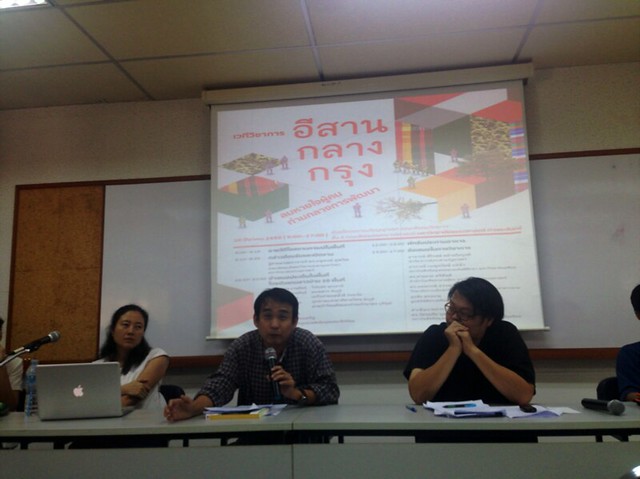Community members, lawyers, academics, and students from the Northeast and Bangkok convened this Friday to kick off a new political movement to defend the rights of Isaan people under martial law.

Community members openly discuss widespread repression under martial law in a rare event held in Bangkok on Friday.
BANGKOK- On Friday morning, Khon Kaen University law students from the activist group Dao Din, gathered sleepily after a long train ride to the capital, before walking into a conference room at Thammasat University. Jatupat Boonpattararaksa, one of the students who staged a three-finger salute protest at Prime Minister Prayuth Chan-o-cha’s speech in Khon Kaen last December, briefed the students on the security protocol for the day, in case the seminar was shut down.
“Make sure you move villagers to a safe location if anything happens,” he told his peers before the seminar began.
Over sixty people joined the seminar under the name,“Isaan in the Middle of Bangkok: Peoples’ Life in the Center of Development.” Isaan community groups, students, academics, and lawyers discussed the effects of martial law and the immediate need to repeal it. They declared “New Isaan,” as an emergent political movement in opposition to military rule. Despite the students’ preparation for potential military intervention, the seminar was held without interruption.
The need for the security plan echoed the same climate described by Isaan villagers who feel the daily effects of martial law. Representatives from over ten communities across the Northeast joined the seminar, including those from the gold mine affected area in Loei Province, the forest community that was evicted from Kao Baat, village of Non Din Daeng District in Buriram Province, the potential natural gas sites in Kranuan District of Khon Kaen Province and Kalasin Province, a water transferal project in Roi Et Province, the potential industrial zone in Nam Phong District of Khon Kaen Province, the Phu Pan National Park in Sakon Nakhon Province, and the potential Pong Khun Phet Dam in Chaiyaphum Province.
According to Mr. Jatupat, the seminar was held in Bangkok because it is the country’s center of power and home of the decision makers that Isaan people struggle against.
Villagers expressed many common sentiments, including living life in fear and the disconnect between Bangkok and the Northeast. Porntip Hongchai, a forty-five-year-old activist from the gold mine area in Loei province, described her frustration.
“People in Bangkok hold these stereotypes against us Northeasterners. They think we’re poor and stupid; that we have nothing. We’re good singers or just a joke in the media, but our homes are for mining and industry. They don’t listen to us at all. The New Isaan won’t be obedient to those in power any more.”
Many members described the military presence and surveillance in their communities that came with martial law. They claimed that the military uses the law to negotiate villager compliance with industry interests.
“National security agencies and soldiers still have the mindset that villagers who remain in the forest are communists. They’ve made our relationships with local authorities worse,” said thirty-two-year-old Paitoon Soisod of Kao Baat.
“It’s clear that the military and the company are working together,” added fifty-nine-year-old Pakon Srakangtoom, a villager from Kranuan District.
In their testimonies, villagers stated that they have always had issues with past governments, but the limits on demonstration and expression have now made it nearly impossible for them to defend their rights.
“I don’t see the light at the end of the tunnel with regards to martial law,” said Mr. Paitoon, “the fear is deeply embedded into our hearts, but we continue to fight. If we don’t fight, we’ll die.”
To which moderator, Kornchanok Saenprasert, responded, “Now the situation is, if you fight, you’re dead. But if you don’t fight, you’re still fucking dead.”
The morning panel concluded with Ms. Porntip reading “The Declaration for the New Isaan” (read it here), a powerful reckoning with the Central region’s dominance over the Northeast and call to arms against the military government. Student activists played “The Song of Commoners ” while members of the seminar sang along.

Jatupat Boonpattararaksa, a Dao Din activist, and Nathapong Phukaew from Friends of Activists Network perform “The Song of Commoners”.
During the afternoon panel several lawyers and academics, both from Bangkok and the Northeast, discussed the historic context of martial law and the continual conflict between Bangkok and the Northeast.
“The government always tells the people they should sacrifice the environment they depend on for the rest of the country,” said Bencharat Chua, lecturer of Human Rights and Peace Studies at Thammasat University. She continued, “Now they ask them to sacrifice their right to protest for the peace and harmony of the country.”

“The hypocrisy of Bangkok is that they don’t want Isaan people to have their own political expression,” said Samchaiy Sresunt (center), a faculty member at the Graduate Volunteer Centre at Thammasat University.
As the event came to an end, twenty-seven-year-old organizer Suttikiat Khontchaso thanked the participants for joining. “Even those who weren’t invited,” he said referring to the four alleged plainclothes military representatives that were present taking pictures of the event.
“This is the day we establish New Isaan, a movement for Isaan people to join,” Mr. Suttikiat concluded, “Isaan is historically the birthplace of political movements, and ours is no different. We hope that this movement can serve as an example to people in other regions.”
The Dao Din student activists were also hopeful about this new movement’s potential. Mr. Jatupat said,“I hope that New Isaan will be able to create change. People should not just receive the policies that are handed to them. They should create their own future.”

